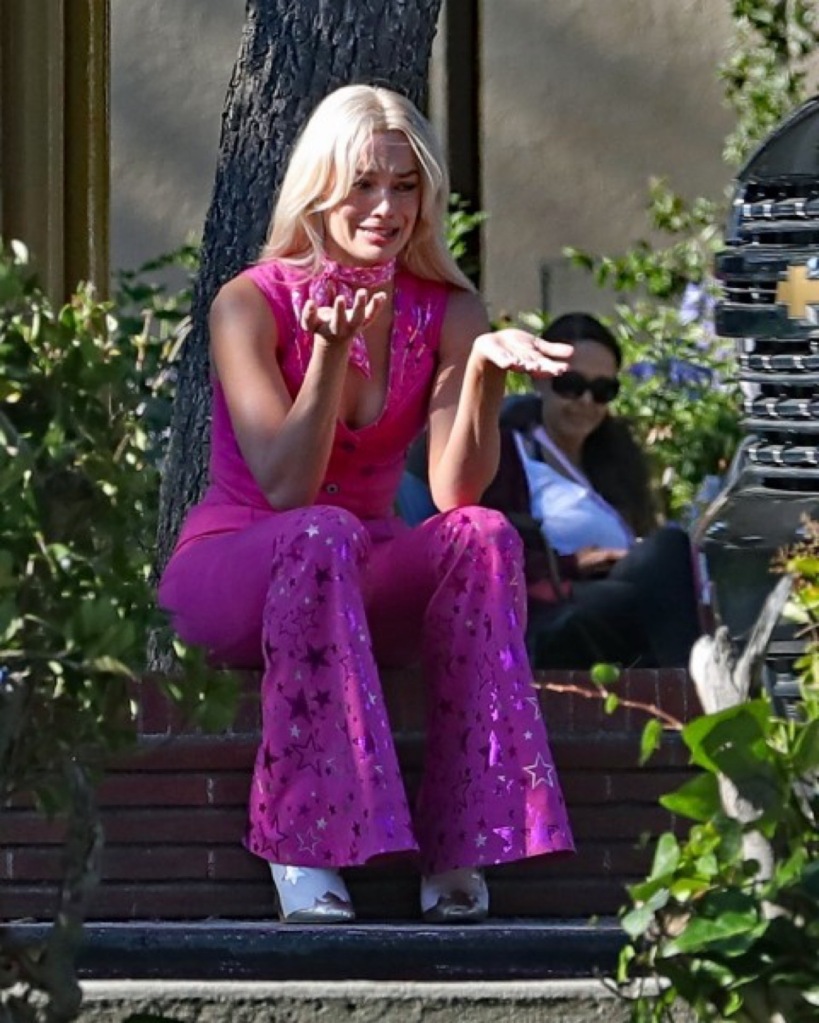
We quite properly laugh contemptuously when the Far Right denounces Greta Gerwig’s new film, Barbie, as an expression of “the woke ideology,” which in turn is supposed to be the product of an imaginary phenomenon called “Cultural Marxism.” But the brainlessness and superficiality of the Right should not stand in the way of our asking the legitimate question, could there be something to the idea that Barbie has genuine roots in the broad Marxist tradition?
I don’t want to review Barbie — it’s too complicated and multi-layered, and I don’t think I can really do it justice. But I do want to place here a few comments on the relation of Gerwig’s Barbie to the Marxist tradition and anti-systemic politics. (Crucially important aspects of the film, about mothers and daughters, about culture and self-understanding, about the relation between the culture industry and social movements, and so on, are omitted here — not because they’re not important to the film, or even to Marxism, but because there’s just too much to think and talk about. I imagine books and dissertations will be written about Barbie, and I look forward to reading them, but I’m only offering a few narrowly focused comments.)
When Gerwig’s last film, Little Women came out, I noted in my review that she was engaging with ideas central to Marxism:
The film [‘Little Women’] addresses what Marx calls the ‘two-fold character of labour,’ or what the film depicts as the two forms in which a craft (like music-making, book-making, art-making, shoe-making, people-making, and so on) can have ‘value’: first, the value of what the film calls ‘a business proposition,’ the value of buying and selling, marketing a product to a paying consumer; second, the value of what the film calls ‘importance,’ which arises when someone carefully *crafts* something *for* someone: a sketch, a story, a musical performance, a play, a book, a pair of shoes, a novel. In almost every scene, someone is producing one or the other of these two forms of value, very often both. And the crucial question, in the plot, is who will ‘save the family,’ and how? Will salvation come in the form of a business proposition or in the form of an act of crafting something for someone with care?”
In this new film, Gerwig implicitly engages again with Marxism, although not quite in its ‘classical’ version (that is, she does not engage with Marx’s ideas as such). Instead, Gerwig’s Barbie engages with an important offshoot of the Marxist tradition: Herbert Marcuse’s vindication of the critical potential of utopianism and fantasy. (See, for a brief overview, Marcuse’s essay, “The End of Utopia.”) Gerwig’s reason for engaging with Marcuse — precisely in this context — is that Marcuse pondered deeply the very thing Barbie wants us to consider: that childhood fantasies of a life of freedom, ease and self-enjoyment, when confronted with the ‘reality principle’ of a repressive society, cannot simply be taken on board as plausible descriptions of the world as it is, but they can be brought to bear as critical resources for accusing the status quo (patriarchal capitalism) of irrationally withholding from us the free and fulfilling lives that we long to attain for ourselves and those we care about and care for.
The central plot trajectory of Barbie (no spoilers!) is that a working-class Latina named Gloria (a Mattel employee, as it happens) reconfigures her relation to, and in a way lets go of her nostalgic attachment to, the utopian-fantastical impulses of her girlhood, but not before vindicating the critical importance of those impulses in the ‘Real World’ (in a double sense of critical as ‘being indispensable’ and ‘challenging to systems of power.’) Gloria’s fantasy-Barbie will cease to be ‘an idea,’ a perfectionist fantasy, and become integrated into Gloria’s real life as an anti-systemic impulse and critical resource for a fully embodied working-class woman to value deeply and fight passionately for the liberation and happiness of herself and other women, in a ‘Real World’ that for now remains determined to subject women to the ‘reality principle’ of capitalist patriarchy.
The key to Gloria’s vindication of the Barbie Land utopia — fending off the attempt of patriarchy (the Kens) and capitalism (the Mattel executives) to “put Barbie back in the box” — is to turn Barbie’s utopian dimension, embodying the young girl’s fantastical, imagined life of freedom and equality, against the forms of domination and exploitation that those systems always want Barbie to serve. Barbie forced into the box is a ‘fascist’ (as Gloria’s daughter puts it) and anti-woman source of misery, but the utopian Barbie deployed “against and beyond” the box, as a vehicle for articulating anti-systemic needs, aspirations and critical insights about unfreedom and exploitation, is a critical ideal that can embrace women as they are, while pointing toward the utopian project of a liberation from patriarchy and capitalism. In this way, Barbie Land as critical utopia of repressed possibilities for emancipated womanhood operates in relation to the Real World as counter-ideal, a “world turned upside down.”
The basic literary device for exploring all this in Gerwig’s Barbie is the duplication of Gloria into her real-world self and Barbie. Barbie is Gloria’s childhood fantasy of living perfectly, free of constraints or threats or stares or insults. But as long as Barbie lives in that mode, as trouble-free fantasy Barbie, Gloria remains stuck in a double world. On the one hand, there is who she is, as a working-class mom living in the Real World (where the constraints, aggressions, and humiliations that are banished from Barbie Land remain fully in effect). On the other hand, there is who she imagined she was supposed to be, in Barbie Land (the “perfect” world of her childhood fantasy of freedom and playful self-enjoyment).
The transition from girl to woman, from fantastical imagining of trouble-free life, to the real world of patriarchal troubled struggle-life, can take either of two forms, Gerwig’s film suggests: in the system-adaptive mode, Barbie can operate in the woman’s psyche as a generator of self-doubt, self-disappoint, even self-hatred, in which Barbie lives on as a kind of self-accusation or constant critic; alternatively, though, Barbie can operate in the as a vehicle for critical challenges to the repressive and oppressive systems that deny possibilities of freedom and ease that are in fact available in principle, in which case Barbie operates instead as a utopian impulse and a vindication of repressed needs and hopes. In Barbie Gloria and her comrades discover that this second, critical-utopian Barbie has to be take root in anti-systemic political movements, for example in the form of collective ‘consciousness-raising’ where critical insights about sexism are developed and taken seriously. But the latter, the anti-systemic and woman-positive Barbie, operating in-against-and-beyond patriarchal capitalism in the Real World, is ultimately a scenario in which Barbie has to ‘die’ for Gloria, in the sense that the doubling of Gloria into her real self and the Barbie fantasy has to give way to a willingness to say YES to actual women, including herself as an actual woman, while saying NO to the back-in-the-box “reality principle” of the Kens and the Mattel execs. Barbie has to be retired as fantasy, and that means also that Barbie is revived as a living embrace of embodied women struggling to break out of the “box” of repressive patriarchal capitalism.
In the end, the journey of Gloria — the main character, in so far as Barbie is a part of Gloria — along the ‘pink brick road’ is a journey of integrating something that has come to seem alien to her: a childhood fantasy that imagined life as playful freedom and being-oneself whole-heartedly. What the film argues is that women and girls have to actively integrate Barbie into the Real World, in the form of a kind of feminist critique and refusal of patriarchy, a reassertion and vindication of the relevance and the emancipatory-utopian energies of those childhood fantasies of freedom and fulfillment.
Anyway, Gerwig’s turn from Marx (in Little Women) to Marcuse (in Barbie) is interesting, even if it is bound to be controversial among Marxists. I think it suits Barbie — which for obvious reasons foregrounds the play and fantasy dimension, so important to Marcuse. It is arguably a dimension of the broad Marxist tradition that is more relevant to the stakes here. But does Barbie do enough to think through Gloria’s situation as a working-class woman? To be sure, the figures of ‘President Barbie’ and ‘Supreme Court Barbie’ are presented as childhood fantasies that are bound to be disappointed by real-world capitalism and patriarchy — they are not supposed to be realistic aspirations. Gerwig never stoops to denialism about class: quite the reverse. Ultimately, the idealism of Barbie Land is presented as something that can go either way: if it is forced by patriarchal capitalism back into the box, it becomes a prison for women, a form of social control. But the forms of struggle that Barbie foregrounds, especially the classical form of ‘consciousness-raising,’ do not really seem, even in the film, to open up the possibly of decisively defeating the systems they ruthlessly critique. So, there are important questions that Marxism wants to foreground, questions of strategy and the sources of anti-systemic power for working-class women like Gloria, which here (for both Gerwig and Marcuse) remain in the background.
But Gerwig’s basic claim is at least one that Marxists should find interesting: that, if girls and women can protect Barbie Land from being overrun by Kens and corporations and integrate Barbie into their critical relation to the Real World, as an anti-systemic utopian impulse, operating “in, against and beyond” capitalist patriarchy, then utopian Barbie can be a vehicle of critique and refusal, and serve the self-affirmation of women against systems that continually negate them.
___________________________
Related: Review of ‘Sorry to Bother You’ — Is it the Most Marxist Film Ever Made?
